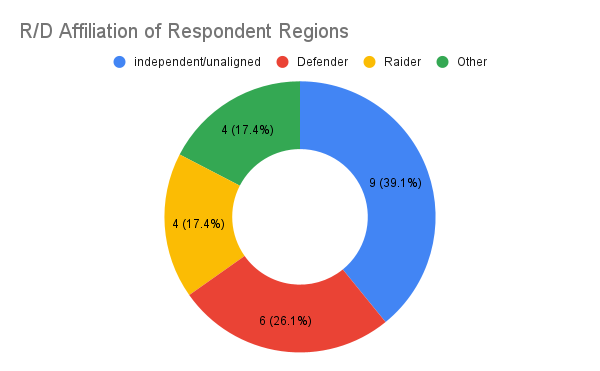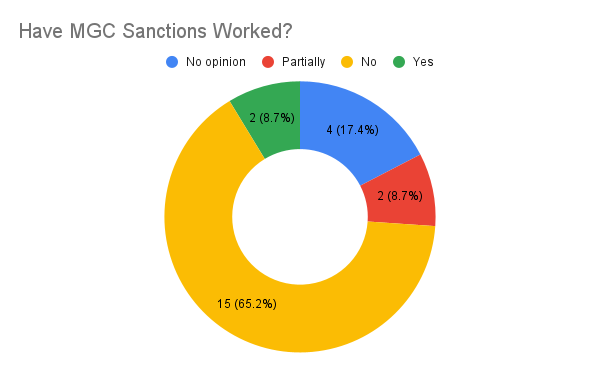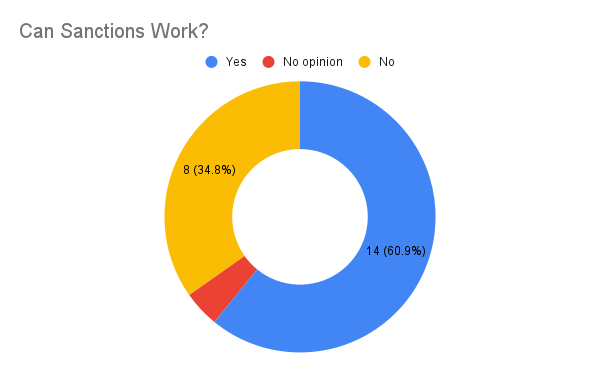- Pronouns
- they/them
MGC Sanctions Unpopular Overall, but Show Some Marginal Effectiveness
MGC sanctions prove unpopular among regional leaders, but results indicate marginal effectiveness in getting certain regions to disassociate with those sanctioned. Read all about it in today's Gem Research Center independent study!
Written by Gem
On March 20th, 2024, following an intriguing conversation, I began reaching out to the leaders of NationStates’ largest, most active, and most involved regions with a survey. Only one response was allowed per region, with the goal of ascertaining the effectiveness of sanctions as a tool in regions’ foreign affairs toolkit by analyzing how regions’ policies have changed (or stayed the same) as a response to the most notable modern example of sanctions in NS, those of the Modern Gameplay Compact.
The stated goal of MGC sanctions is to dissuade other regions from affiliating with the sanctioned regions, so the member communities of MGC were excluded from this study, as were the regions explicitly named in the latest round of sanctions. Europeia, The North Pacific, Balder, and The League & Concord were not surveyed due to being part of MGC, while The Brotherhood of Malice, The Black Hawks, The Communist Bloc, and Sparkalia were not surveyed due to being named.
Despite so many regions being excluded, I’m extremely proud of how many responses I received. There aren’t a massive number of relevant regions in NS, and of those that are, a whopping 23 regions contributed to this study, which was over two-thirds of those that were contacted. Though no sample could hope to be perfectly representative of such a massive and complex game as NationStates, I’m quite satisfied that the size, number, and diversity of responses will allow me to draw an accurate and applicable conclusion from this data.
I would also like to take a moment to thank Archangel Shadow, who was absolutely invaluable in reaching out to regions in the raidersphere, which I don’t have regular contact with. And, of course, thank you to all of the regional leaders who took the time to deliver comprehensive responses regarding their regions’ policies to some stranger on the internet. I couldn’t have done this without you.
Contents |
Of the 23 regions surveyed, nine (39.1%) self-identified as independent or unaligned; six (26.1%) self-identified as defender, four (17.4%) self-identified as raider, and four (17.4%) identified with another or no R/D label. This is a fairly even spread of regional R/D affiliations, which should reduce the impact of regional bias on overall results.
Based on regions’ self-reported likelihood–from 1 (least likely) to 5 (most likely)–to engage with sanctioned regions in ten circumstances, they were assigned a Sanctioned Regions Friendliness Score: ranging from 10 (least friendly) to 50 (most friendly). Yes, it’s just a sum of their answers, don’t @ me, I don’t have a degree. (yet)
Those ten circumstances being:
The mean and median averages of these SRFS results can be found in the above tables. They show that Defender regions were the least likely to engage with MGC sanctioned regions, followed by Independent/Unaligned regions, followed by “other” regions, while Raider regions were the most likely to engage with MGC sanctioned regions by far.
Those ten circumstances being:
- Likelihood to engage with the currently sanctioned regions in a R/D operation.
- Likelihood to encourage your citizens to participate in a cultural event hosted by the currently sanctioned regions.
- Likelihood to collaborate with the currently sanctioned regions on a cultural event.
- Likelihood to allow a citizen/equivalent status of the currently sanctioned regions to participate in a cultural event hosted by your region.
- Likelihood to accept a citizenship application from a citizen/equivalent status of the currently sanctioned regions.
- Likelihood to accept a citizenship application from a government official in the currently sanctioned regions.
- Likelihood to allow a citizen/equivalent status of the currently sanctioned regions to take up a governmental post in your region.
- Likelihood to allow a government official in the currently sanctioned regions to take up a governmental post in your region.
- Willingness to be a part of a coalition or faction with which a currently sanctioned region is also involved.
- Likelihood to sign a treaty or non-aggression pact with the currently sanctioned regions.
The mean and median averages of these SRFS results can be found in the above tables. They show that Defender regions were the least likely to engage with MGC sanctioned regions, followed by Independent/Unaligned regions, followed by “other” regions, while Raider regions were the most likely to engage with MGC sanctioned regions by far.
Looking at mean results, we can see that, overall, following the rollout of MGC sanctions, regions were ~10% less likely to engage with the sanctioned regions. This value was driven primarily by a ~18% reduction among Independent/Unaligned regions, and a ~13% reduction among Defender regions. Regions identifying as Raider were ~5% more likely to engage with sanctioned regions post-rollout, while “other” regions were only ~4% less likely to engage with sanctioned regions as compared to prior.
The median results give a little more insight into this data, however. Though there was a notable reduction in average SRFS, the median region in the set saw no change in SRFS before and after sanctions. This also applies to Defender and “Other” regions. This would seem to indicate that the shifts in average SRFS were driven primarily by large changes in just a few regions, rather than a consistent effect across many regions. This doesn’t mean sanctions were ineffective, necessarily, simply that they only affected some regions, and not others.
The exception to this was in Independent/Unaligned regions, and Raider regions, which both saw similar median % changes to their mean % changes. This would seem to indicate that Most Independent/Unaligned regions saw a small decrease in their willingness to collaborate with the sanctioned regions, and most Raider regions saw a minute increase in their willingness to collaborate with the sanctioned regions.
The median results give a little more insight into this data, however. Though there was a notable reduction in average SRFS, the median region in the set saw no change in SRFS before and after sanctions. This also applies to Defender and “Other” regions. This would seem to indicate that the shifts in average SRFS were driven primarily by large changes in just a few regions, rather than a consistent effect across many regions. This doesn’t mean sanctions were ineffective, necessarily, simply that they only affected some regions, and not others.
The exception to this was in Independent/Unaligned regions, and Raider regions, which both saw similar median % changes to their mean % changes. This would seem to indicate that Most Independent/Unaligned regions saw a small decrease in their willingness to collaborate with the sanctioned regions, and most Raider regions saw a minute increase in their willingness to collaborate with the sanctioned regions.
Altogether, it’s difficult to construe these results as an unambiguous success on MGC’s part. Though there was a definite change in SRFS, especially in Independent/Unaligned regions, the change was relatively small, and, with the exception of Independent/Unaligned regions, change was driven by just a few greatly affected regions. General opinion regarding MGC sanctions is also intriguing: 15 out of 23 regions believed that MGC sanctions were ineffective, two believed they were partially effective, and only two believed they were effective. Furthermore, when pressed to give comments, regions didn’t have much good to say:
- “There needs to be a distinction that sanctions are [to] be IC sanctions and not OOC punishment imo. An R/D event? Sure that’s worthy of a sanction, a festival celebrating a regional event, worthy of an IC sanction imo since you can restrict it to who you like. But if you are hosting a general holiday event that has 0 IC events there’s no reason to ban people from that. OOC sanctions only seek to enforce that [players] are OOC bad people for how they play the game…”
- “I often find myself more frustrated with those applying the sanctions than those sanctioned, as it torpedoes events if even a single sanctioned member is in attendance. It really only affects those not invested in a conflict, and makes our lives more difficult.”
- “Sanctions such as these ones only serve to divide peeps on arbitrary regional lines and create animosity between communities.”
- “Like anything else in a video game with minimal win conditions, everything is performative and nothing has a “real” effect, so other avenues have to be viewed. Formal sanctions are another tool, and have existed in many informal forms over the years. “Effective” in the sense of sending a message the regions involved wanted, probably. “Effective” in defeating an opponent? Probably not.”
However, despite widespread dissatisfaction with MGC sanctions, the majority of regions believed that sanctions could work in some form. Some regions expanded further on why they felt that was the case:
- “Some people find the whole R/D scenario in general “silly” and so tend to ignore all aspects of it, meaning little comes of sanctions in the first place: Sanctions can just as easily be ignored but with enough weight behind them they can be effective.”
- “Sanctioning should be a first step, or even a second step. Doing so after declaring war is like throwing a cup of water into a lake and hoping that someone will notice/care.”
- “The amount of pressure applied and regional exceptions determines their effectiveness.”
MGC Statement (or lack thereof) and Conclusion
The regions making up the Modern Gameplay Compact were contacted and provided with a draft of this article, in order to provide them with the opportunity to provide a comment on the details of the results.
They declined to issue a statement.
Overall, the results of this study are quite mixed when it comes to the effectiveness of MGC Sanctions. There was a definite decrease in the average willingness of regions to engage with sanctioned regions after the rollout of sanctions, but the impact was small and generally inconsistent. Furthermore, it should be noted that, as one regional leader pointed out:
“Some regions unaffiliated with the MGC have reduced involvement with the sanctioned regions because said sanctioned regions aggravated them, entirely independently of the MGC and its sanctions.”
This, in conjunction with the general unpopularity and lack of confidence the surveyed regions had in MGC sanctions, prevent me from concluding that they were an unambiguous success. They are, most likely, only marginally effective. Whether or not that level of impact is sufficient for MGC’s goals is ultimately, not something I’m capable of commenting on at at the moment.
Curiously, however, most regions did believe that sanctions in some form could be successful. So it’s possible that MGC could revise their sanctions to some effect, or perhaps another organization could use sanctions to more success in different circumstances. Only time will tell.




